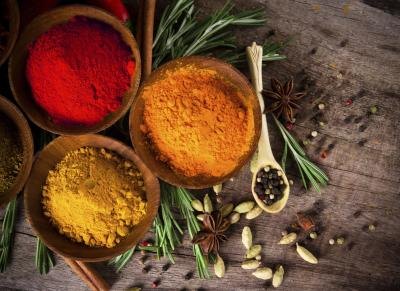
For over 4,000 years, turmeric spice has been used in cooking and medicine. In cooking, it is typically ground into a gold-colored powder and added to foods. For medicinal purposes, it is available as a standardized powder that may be encapsulated. It may also be obtained as a fresh root, dried root, fluid extract or tincture.
Source
Turmeric is a spice made from the roots of the Curcuma longa plant. It is a relative of the ginger plant and produces a stalk over 5 feet tall with yellow flowers. The plant grows throughout tropical areas of southern Asia, although the majority of the crop comes from India. The spice is produced by boiling the roots and bulbs, drying them to obtain the characteristic yellow color and grinding them into powder.
Ingredients
Curcumin, the active chemical ingredient in turmeric, is a potent antioxidant compound. It is able to bind and neutralize free radicals that form in cells and tissues in response to normal metabolism and environmental conditions. These free radicals may cause tissue damage, cell death, cell membrane damage and DNA mutations.
Uses
Turmeric has a long history of use in cooking and medicine. It is used to add flavor or color to curries, mustards, butters and cheese. It has traditionally been used for stomachache, heartburn, diarrhea, intestinal gas, stomach bloating, loss of appetite, jaundice, liver problems and gallbladder disorders. It is under investigations for use as a treatment for headaches, bronchitis, colds, lung infections, fibromyalgia, depression, Alzheimer’s disease, worms, kidney problems and certain cancers. However, many of these studies have only been performed in laboratory settings with cells. It is not yet known whether turmeric is effective for these conditions in humans.
Cautions
Turmeric may inhibit the clotting of blood and should not be combined with other medications for clotting, such anticoagulants or antiplatelet drugs. Bruising and bleeding may occur if turmeric is combined with aspirin, clopidogrel, diclofenac, ibuprofen, naproxen, dalteparin, enoxaparin, heparin or warfarin. Women who are pregnant or breastfeeding may safely eat turmeric in foods but should not consume medicinal amounts of the herb.
www.livestrong.com





No comments:
Post a Comment